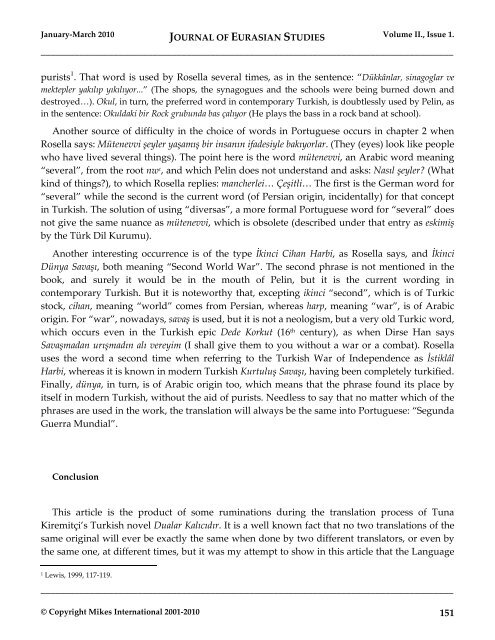EurasianStudies_0110..
EurasianStudies_0110..
EurasianStudies_0110..
You also want an ePaper? Increase the reach of your titles
YUMPU automatically turns print PDFs into web optimized ePapers that Google loves.
January-March 2010 JOURNAL OF EURASIAN STUDIES Volume II., Issue 1.<br />
_____________________________________________________________________________________<br />
purists 1 . That word is used by Rosella several times, as in the sentence: “Dükkânlar, sinagoglar ve<br />
mektepler yakılıp yıkılıyor...” (The shops, the synagogues and the schools were being burned down and<br />
destroyed…). Okul, in turn, the preferred word in contemporary Turkish, is doubtlessly used by Pelin, as<br />
in the sentence: Okuldaki bir Rock grubunda bas çalıyor (He plays the bass in a rock band at school).<br />
Another source of difficulty in the choice of words in Portuguese occurs in chapter 2 when<br />
Rosella says: Mütenevvi şeyler yaşamış bir insanın ifadesiyle bakıyorlar. (They (eyes) look like people<br />
who have lived several things). The point here is the word mütenevvi, an Arabic word meaning<br />
“several”, from the root nw c , and which Pelin does not understand and asks: Nasıl şeyler? (What<br />
kind of things?), to which Rosella replies: mancherlei… Çeşitli… The first is the German word for<br />
“several” while the second is the current word (of Persian origin, incidentally) for that concept<br />
in Turkish. The solution of using “diversas”, a more formal Portuguese word for “several” does<br />
not give the same nuance as mütenevvi, which is obsolete (described under that entry as eskimiş<br />
by the Türk Dil Kurumu).<br />
Another interesting occurrence is of the type İkinci Cihan Harbi, as Rosella says, and İkinci<br />
Dünya Savaşı, both meaning “Second World War”. The second phrase is not mentioned in the<br />
book, and surely it would be in the mouth of Pelin, but it is the current wording in<br />
contemporary Turkish. But it is noteworthy that, excepting ikinci “second”, which is of Turkic<br />
stock, cihan, meaning “world” comes from Persian, whereas harp, meaning “war”, is of Arabic<br />
origin. For “war”, nowadays, savaş is used, but it is not a neologism, but a very old Turkic word,<br />
which occurs even in the Turkish epic Dede Korkut (16 th century), as when Dirse Han says<br />
Savaşmadan urışmadın alı vereyim (I shall give them to you without a war or a combat). Rosella<br />
uses the word a second time when referring to the Turkish War of Independence as İstiklâl<br />
Harbi, whereas it is known in modern Turkish Kurtuluş Savaşı, having been completely turkified.<br />
Finally, dünya, in turn, is of Arabic origin too, which means that the phrase found its place by<br />
itself in modern Turkish, without the aid of purists. Needless to say that no matter which of the<br />
phrases are used in the work, the translation will always be the same into Portuguese: “Segunda<br />
Guerra Mundial”.<br />
Conclusion<br />
This article is the product of some ruminations during the translation process of Tuna<br />
Kiremitçi’s Turkish novel Dualar Kalıcıdır. It is a well known fact that no two translations of the<br />
same original will ever be exactly the same when done by two different translators, or even by<br />
the same one, at different times, but it was my attempt to show in this article that the Language<br />
1 Lewis, 1999, 117-119.<br />
_____________________________________________________________________________________<br />
© Copyright Mikes International 2001-2010 151

















